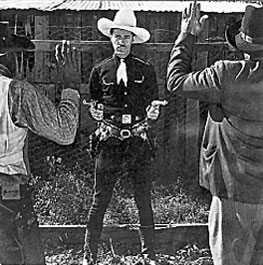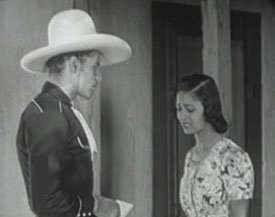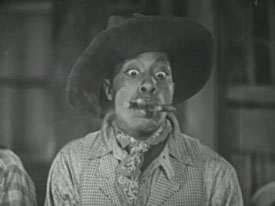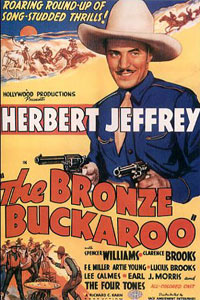 Herb Jeffries -- who married Burly-Q Tempest Storm -- starred in four black-cast westerns, bringing the "singing cowboy" image to African American kids & their families of the late 1930s.
Herb Jeffries -- who married Burly-Q Tempest Storm -- starred in four black-cast westerns, bringing the "singing cowboy" image to African American kids & their families of the late 1930s.
It's been estimated that in many parts of the southwest & California, fully one-fourth of working cowboys were black, a reality Hollywood was rarely interested in reflecting.
And it's bizarre to think that Herb Jeffries' singing cowboy stint came on the coattails of Terror in Tiny Town (1938) on the premise "If there can be a cowboy movie populated exclusively by midgets, why not a cowboy movie populated by black people."
Jeffries is usually regarded as the only black singing cowboy of film history, though Louis Jordan's Look Out Sister (1946) certainly qualifies Jordan as a one-off singing cowboy too, unquestionably inspired by Jeffries' films. It's odd, though, that Jeffries' films opened no floodgate, & to this day a filmography of black cowboy films remains small & mostly relegating the black cowboy to support roles.
The tall slim singer's take on western swing music was glorious. Herb was as handsome as & more elegant than Roy Rogers. He was the perfect choice for the western genre.
But being a B-movie cowboy wasn't Jeffries' be-all & end-all. He quit the movies in favor of an opportunity to go on the road as Duke Ellington's singer, & his mellow barritone became identified with popular jazz & the big-band sound. Additional cowboy films had been planned for him, but alas were never to be, & no one looked around for another such western hero type.
 His sobriquette "the bronze Buckaroo" followed him throughout his career. He was just too good in these performances for these films ever to be forgotten. His sobriquette "the bronze Buckaroo" followed him throughout his career. He was just too good in these performances for these films ever to be forgotten.
In 1995 at the age of eighty-three he recorded an album in Nashville, The Bronze Buckaroo Rides Again, & received the Golden Boot Award the following year, & the Cowboy Spirit Award in 1999.
He would eventually be inducted into both the Western Performers Hall of Fame & the National Cowboy & Western Heritage Museum.
In The Bronze Buckaroo (1938), lean Herb Jeffries sure looks good in a cowboy hat & two six-guns. He plays Bob Blake, who right off the bat sings his character's theme song "I'm a Happy Cowboy" behind the opening credits.
It's a superb piece of western swing crossed with the kind of sweet harmonies from the Four Tones, a sound that came to be associated with the Inkspots. Jeffries truly mixed the African American influence with western swing in an innovative way, & he undeniably possessed one of the smoothest sweetest voices of the era.
Bob arrives in town with a letter received some weeks before, from his old friend Joe Jackson. He soon learns Joe went missing shortly after his father was murdered by unknown assailants. There's a mystery to solve & an injustice to set bring to rights, & Bob Blake with his buddies is just the guy to pursue just ends.
The Four Tones perform "Almost Time for Round-up," a nice simple western swing tune sung in a saloon, getting all the patrons to join in. This harmony quartette was made up of Lucius "Dusty" Brooks, Rudolph Hunter, Leon Buck & Ira Hardin. They in all of Jeffries' westerns.
 Dusty provides the comic relief as Bob's "funny sidekick," such characters being de rigour for singing cowboy movies. He buys a mule for $12.00, having been tricked by a ventriloquist into believing the beast can talk. Dusty provides the comic relief as Bob's "funny sidekick," such characters being de rigour for singing cowboy movies. He buys a mule for $12.00, having been tricked by a ventriloquist into believing the beast can talk.
He spends much of his screen time thereafter trying to get the mule to say something, until he catches on to the facts & sets out to turn the tables on the hornswoggling Slim (Flourney E. Miller).
Slim may be a bit of a con artist but is not a bad guy, & will use his ventriloquist abilities in the climax to insure the safety of the good guys.
"Got the Payday Blues" is sung by Herb, a jump-jive number backed up by the Four Tones, with some of Dusty's tapdancing thrown in.
Buck Thorn (Clarence Brooks), neighboring rancher, wants to buy Joe's ranch. Now that Joe's been missing a month, Thorn approaches his sister Betty (Artie Young), pretending he's out to do the young woman a favor, though his threatening henchman Bad Pete (Spencer Williams) is just one clue that Buck's no good.
Known to very few, there's gold on Joe's property, & Thorn has kept Joe captive trying to force him to sign over his deed. It's fun to hiss the villain on the way to the happy ending. When the closing swing harmonies of the Four Tones on "Get Along Mule" arrive, any western lover will be left feeling good.
The songs were written by Lew Porter, who wrote great songs for many of the B-movie cowboys of the time. The talent in this film is so high that as a B western (such as were reliant on cliche plots & situations), this one really pops out of the crowd as a great example of the form. Herb stands right up there with Roy & Tex & Gene.
copyright © by Paghat the Ratgirl
|

